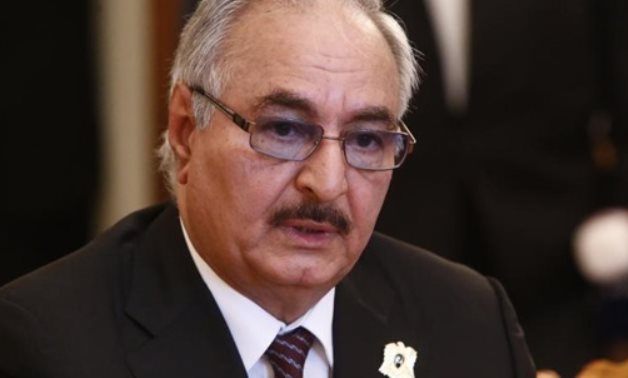
FILE PHOTO: General Khalifa Haftar, commander in the Libyan National Army (LNA) in Moscow, Russia August 14, 2017. REUTERS/Sergei Karpukhin
CAIRO – 3 August 2020: In a speech delivered in a visit to a company, Commander-in-Chief of the Libyan National Army (LNA) Khalifa Haftar stated Sunday that the Turkish presence in Libya will be faced with bullets.
"Turkish President Erdogan came to Libya to search for his ancestor's legacy but we will face him with bullets," Haftar said pointing out that the Libyan people is able to teach the Turkish invader a lesson to remember. The commander pledged to achieve victory and clear Libyan soil from Turks and mercenaries.
"The Libyan army will continue defending our homeland against aggressors. The Libyan people will not accept colonization again after it had been subject to theft and robbery…We will not accept the backward Turkish again," Haftar stressed.
Sky News Arabia reported on the same day that clashes occurred between militias affiliated to Minister of Interior of the Government of National Accord (GNA) Fathy Bashagha and militias affiliated to GNA's Commander of the Western Military Zone Osama al-Gweily.
"The General Command of the Libyan National Army (LNA) draws the attention of countries whose ships and jets get near Libyan waters and airspace to the necessity of coordination beforehand in order to avoid engagement," a statement by LNA Spokesperson Ahmed al-Mesmary read Saturday.
Commander of Mobilization at the Libyan National Army (LNA) Khaled al-Mahgoub unveiled July 25 that Syrian mercenaries transported by Turkey are being turned into police forces by the Ministry of Interior affiliated to Tripoli-based Government of National Accord (GNA).
Mahgoub stated that the first batch of those started patrolling the capital after receiving training at Takbali Camp southern the city and the police uniform.
The LNA spokesperson posted July 24 a video showing dozens of mercenaries on board of an Afriqiyah Airways flight heading to Libya to join the GNA militias' ranks.
The UN Security Council Committee concerning Libya indicated in a report issued Friday that Turkey has sent to the North African state 7,000 to 15,000 Syrian mercenaries. The committee highlighted that Libya is turning into a large market for arms as a consequence of the embargo violations.
Mesmary had stated early in July that Turkey has transported into Libya 25,000 mercenaries. Those include 17,000 Syrian militants, 2,500 Tunisians who fought in the ranks of the Islamic State (IS) in Idlib and Aleppo, and other nationalities including the Sudanese.
Turkey has also sent 2,500 – 3,000 officers and military experts to co-command the operations rooms of the GNA militias and to pilot drones from mainly Tripoli's Mitiga Airbase. The LNA downed around 70 Turkish drones as they were targeting its concentrations.
The LNA announced downing on July 23 a Turkish reconnaissance plane west of the Libyan city of Sirte, which is currently controlled by LNA forces.
On July 22, the LNA warned Turkey against approaching the Libyan coast, threatening to target any hostile naval vessels in the Libyan waters.
Aref Al Nayed, the envoy of the Libyan Parliament speaker said on July 22 that the Libyan parliament is supporting the Egyptian military intervention in his country to stop the Turkish aggression.
On June 20, President Sisi declared Sirte and Al Jufrah in central Libya a red line that if crossed, Egypt's "direct intervention" becomes internationally legitimate.
That is because it is aligned with the UN Security Council resolutions on Libya and Berlin Conference imposing an arm embargo on Libyan factions, banning foreign intervention in the North African State, and advocating for a political solutions. Furthermore, Egypt's intervention is requested by the elected Libyan House of Representatives and Libyan tribes.
In December 2019, Turkey signed with the Government of National Accord (GNA) – which is an interim non-elected government that is recognized by the United Nations – two MoUs on defense and gas drilling in the Mediterranean.
Libyan tribes announced the closure of oil ports and fields in January as the revenues were used by the GNA to pay militants. Early in July, the tribes declared that oil facilities would resume operations. However, the LNA announced on July 11 that such facilities would remain closed until the demands of the Libyan people on dismantling militias are fulfilled. The Libyan National Oil Corporation (NCO) announced that the value of revenues lost until present is $6.5 billion.
On July 5, several "unknown aircraft" launched nine strikes against Oqba Bin Nafea Airbase located in Al Watiyah controlled by the GNA and Turkey. The outcome was the destruction of Hawk air defense systems, and a Koral electronic warfare system as well as the killing of a Turkish commander, and six officers as the operations room they were in was hit.
However, the commander of mobilization stated on July 20 that Turkey still uses Oqba bin Nafea airbase in Al Watiyah western the country to bring in military reinforcements less than a month from losing air defense and electronic warfare systems in strikes by "unknown flights."
On July 20, the Egyptian House of Representatives approved sending troops beyond Egyptian borders on the western strategic direction.
On July 16, President Abdel Fatah al-Sisi met with Tribe leaders belonging to eastern, central, and western Libya in Cairo as they demanded Egypt's military support to repel Turkish aggression. "We will enter Libya upon the request of the Libyan people, and will leave it in compliance with the order of the Libyan people," the president stated.
On July 13, the Libyan House of Representatives issued a statement allowing the Egyptian Armed Forces to intervene whenever it perceives a threat to the security of Egypt and Libya describing Turkey as "the invading occupier."
The Libyan Armed Forces restored Sirte in January, and was advancing in the outskirts of Misrata and Tripoli. However, early in June, it lost Al Watiyah and Tarhouna, which was its last stronghold western the country, retreating into Sirte and Al Jufrah.
Comments
Leave a Comment